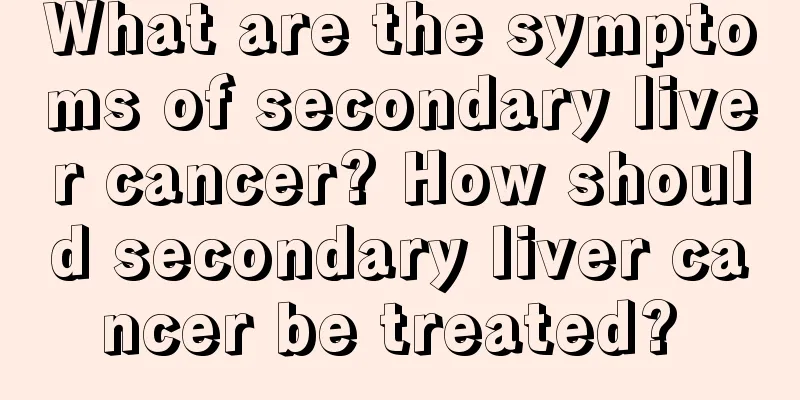What are the symptoms of secondary liver cancer? How should secondary liver cancer be treated?

|
Secondary liver cancer is a condition where primary cancer cells have spread to the liver. Cancers such as bowel cancer, lung cancer, and breast cancer can spread to the liver. For example, when an individual has lung cancer and the cancer cells extend to the liver, then the liver cancer includes cancer cells from the lungs. What are the symptoms of secondary liver cancer? 1. Non-specific symptoms A common symptom of secondary liver cancer is extreme tiredness. Eating small, frequent meals instead of large ones can help control a loss of appetite. Patients may also experience itchy skin. Jaundice may result when the cancer affects a large part of the liver or there is a blockage in the bile duct. Hiccups may occur when the liver presses on a nerve in the chest. Medications may be used to control hiccups. Because the liver helps control body temperature, patients may feel extremely cold or hot. 2. Hepatic ascites In some patients, swelling of the abdomen occurs due to fluid accumulation, and conditions such as blocked lymph glands in the abdomen may prevent the fluid from draining out. Also, when cancer spreads to the liver, it can increase pressure in adjacent blood vessels, forcing fluid out. When the liver cannot produce enough blood proteins, fluid begins to leak from the veins into the abdominal cavity. Doctors insert a needle into the patient's abdomen and drain the abdominal fluid with the help of a catheter, otherwise the fluid may accumulate again. Sometimes doctors permanently insert an inner tube into the patient's abdomen to drain the fluid. How is secondary liver cancer treated? Treatments such as alcohol injections, laser therapy, and microwave ablation are used to destroy cancer cells. In cryotherapy, cancer cells are frozen. 1. Radiation therapy As with X-rays, during radiation therapy, high-energy waves are used to destroy cancer cells. The therapy is used to control symptoms such as pain and cancer cell growth. However, it is not recommended for liver cancer because the liver is very sensitive to this treatment. During selective internal radiation therapy, a catheter is inserted into the hepatic artery, which supplies blood to the liver. Through this tube, the doctor sends a radioactive substance, yttrium, which delivers a dose of radiation to the tumor. In addition to causing damage to the cancer cells, the radiation also interrupts the blood supply to the tumor, a process called radioembolization. 2. Transarterial chemoembolization In another similar procedure, patients are given transarterial chemoembolization (TACE), along with chemotherapy drugs, in an absorbable oily liquid or sponge. The drug mixture prevents the flow of blood, oxygen, and nutrients to the liver while damaging tumor cells. Since the drug mixture is present in the tumor area for quite a long time, the cancer cells receive a high dose of the drug. 3. Radio waves In radiofrequency ablation, radio waves are used to destroy cancer cells, while in radiofrequency-assisted surgery, radio waves are used to destroy cancer cells and remove them from the patient's body. |
<<: How to detect early liver cancer and rule out liver cancer? This test is the most accurate
>>: What is the best way to treat liver cancer? What are the common treatments for liver cancer?
Recommend
What are the treatments for osteosarcoma
After osteosarcoma is diagnosed by pathology, ear...
Symptoms of advanced lung cancer
Cancer is difficult to cure, but if you choose th...
These are the symptoms of HPV infection
The hpv virus is a common sexually transmitted di...
What diseases can't eat celery
The nutritional value of celery is very high. Cel...
The veins on the hands are very obvious
Tendons and veins are one of the most important t...
How long can you live after testicular cancer removal
Testicles are of extraordinary significance to me...
What should you pay attention to in surgical treatment of prostate cancer
There are many treatments for prostate cancer at ...
Does being angry cause diarrhea?
Many friends who get angry easily often run into ...
It hurts if I can't open my mouth wide
The inability to open the mouth and the pain when...
Platelet count
If you find that your platelet count is abnormal ...
What are the causes of fibroids
Nowadays, many patients suffer from diseases but ...
What methods are commonly used to treat lung cancer? The 4 most commonly used treatments for lung cancer
According to relevant data, the number of patient...
What are the differential diagnosis methods for ovarian tumors
Nowadays, women are the hope of the motherland be...
How is the functional rehabilitation exercise for nasopharyngeal carcinoma and how is it beneficial to the treatment of the disease
Functional rehabilitation exercises for nasophary...
How many times a day should I drink vitamin C effervescent tablets
Drinking vitamin C effervescent tablets can reple...









